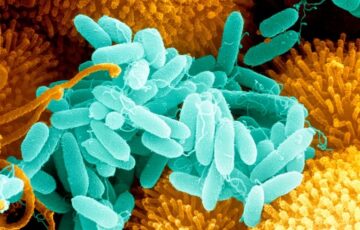Rachel Fieldhouse in Nature:
 A strain of bacterium that often causes infections in hospital can break down plastic, research published this week in Cell Reports reveals1. Researchers in the United Kingdom identified an enzyme, which they called Pap1, in a strain of Pseudomonas aeruginosa isolated from a wound. They found that the enzyme can break down a plastic that is commonly used in health care because of its biodegradable properties, called polycaprolactone (PCL).
A strain of bacterium that often causes infections in hospital can break down plastic, research published this week in Cell Reports reveals1. Researchers in the United Kingdom identified an enzyme, which they called Pap1, in a strain of Pseudomonas aeruginosa isolated from a wound. They found that the enzyme can break down a plastic that is commonly used in health care because of its biodegradable properties, called polycaprolactone (PCL).
Until now, the only enzymes shown to break down plastics were found in environmental bacteria, says study co-author Ronan McCarthy, who researches bacteria and bacterial infections at Brunel University in London. He says that finding the same ability in pathogens often present in hospitals could explain why these microbes persist in these environments. “If a pathogen can degrade plastic, then it could compromise plastic-containing medical devices such as sutures, implants, stents or wound dressings, which would obviously negatively impact patient prognosis,” he adds.
More here.
Enjoying the content on 3QD? Help keep us going by donating now.
